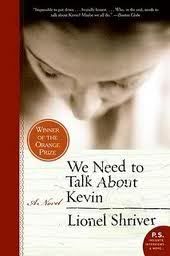First reason: I'm inarticulate.
I collapsed in front of my husband after finishing the read. "WHAT THE ****?"
"What?"
"JEE-sus Christ!"
"What?"
"Omigod. This is one ****-ed up book!"
That's as far as I got with explaining anything.
Second reason: I never know how to rate something I both love and hate.
When I started reading it, I thought: This is gonna be 1 star. Initially, I hated the writing. It's Thesaurusville. It's literary. I hated the naval gazing, the endless introspection. I found myself skimming. I also hated everything about the main character except that she wasn't as utterly-and-unbelievably-stupid as her husband. I would have left the dumb-ass and there would've been no story.
Then, halfway through, I mentally upped it to 3 stars. After all, I'm the one who thrives on stupid, unlikeable characters. I've invented some myself. They kind of grown on you. Who wants to read about brilliant and lovable all the time? Plus I'd been sucked into the story by then, though I still wanted to reach into the pages and slap a few people. More importantly: I'd stopped skimming.
I ended up giving it 5 stars because I could NOT put it down, because I did NOT anticipate the twist, and the ending--right down to the very last sentence--BLEW ME AWAY!!!!!!
Awesome, awesome, awesome!
Now, of course, I must see the movie!

Booklist *Starred Review* In a series of brutally introspective missives to her husband, Franklin, from whom she is separated, Eva tries to come to grips with the fact that their 17-year-old son, Kevin, has killed seven students and two adults... Guiltily she recalls how, as a successful writer, she was terrified of having a child. Was it for revenge, then, that from the moment of his birth Kevin was the archetypal difficult child, screaming for hours, refusing to nurse, driving away countless nannies, and intuitively learning to "divide and conquer" his parents? When their daughter, loving and patient Celia, is born, Eva feels vindicated; but as the gap between her view of Kevin as a "Machiavellian miscreant" and Franklin's efforts to explain away their son's aberrant behavior grows wider, they find themselves facing divorce. In crisply crafted sentences that cut to the bone of her feelings about motherhood, career, family, and what it is about American culture that produces child killers, Shriver yanks the reader back and forth between blame and empathy, retribution and forgiveness. Never letting up on the tension, Shriver ensures that, like Eva, the reader grapples with unhealed wounds.
No comments:
Post a Comment